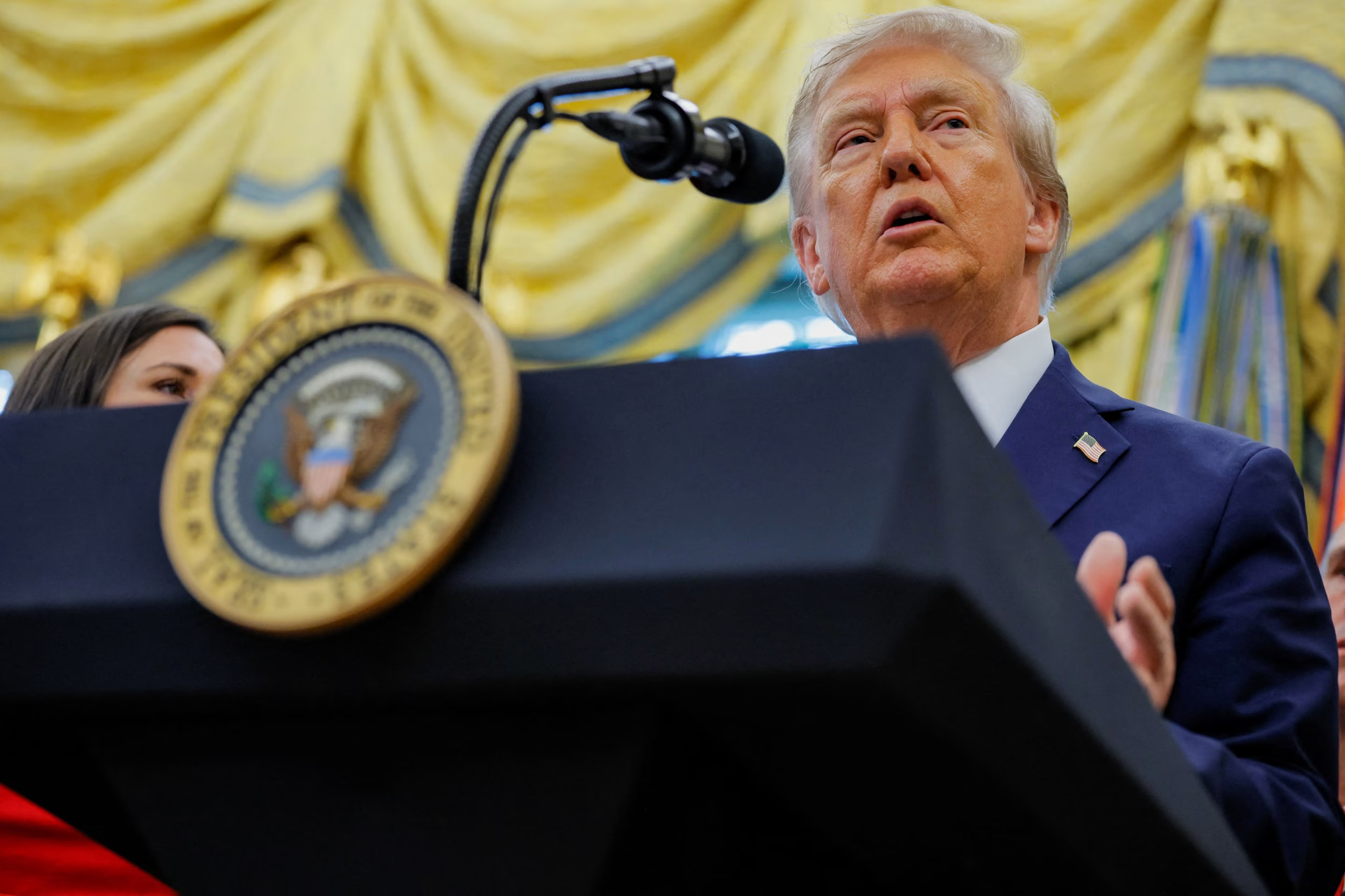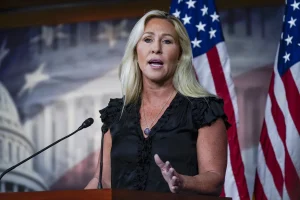President Donald Trump announced on November 23, 2025, that his administration is preparing to officially designate the Muslim Brotherhood as a foreign terrorist organization, a step he has considered since his first term in office. Speaking to Just the News, Trump emphasized that the designation would be executed “in the strongest and most powerful terms,” noting that final documents were being prepared. The announcement represents a continuation of the administration’s long-standing focus on Islamist groups and their global networks and comes amid growing domestic and international discussions on counterterrorism and the regulation of foreign-affiliated organizations operating within the United States.
The Muslim Brotherhood, founded in Egypt in 1928 by Hassan al-Banna, is one of the world’s oldest and most influential Islamist movements. The organization advocates for the integration of Islamic principles into public, political, and social life, aiming for the gradual formation of Islamic societies governed by religious law. According to the George Washington University Program on Extremism, the Brotherhood promotes a “bottom-up, gradual Islamization of society that would eventually lead to the formation of a purely Islamic society and political entity.” While the group has long been influential in the Middle East and North Africa, its operations have sparked controversy due to their perceived political ambitions and the potential destabilization of host countries.
Several nations, including Austria, Bahrain, Egypt, Saudi Arabia, the United Arab Emirates, and Jordan, have already banned or labeled the Muslim Brotherhood as a terrorist organization. Earlier this year, Jordan moved to outlaw the group, citing concerns that its members had engaged in activities “that could destabilize the country” and tampered with national security and public order. Jordan’s Ministry of Interior emphasized that the Brotherhood’s actions had undermined unity and disrupted public safety, highlighting the ongoing tensions between Islamist movements and state authorities across the region.
Trump’s plan to label the Muslim Brotherhood as a terrorist organization in the U.S. builds upon prior efforts during his first administration. Although the process had begun in his initial term, the U.S. did not ultimately join other nations in giving the Brotherhood formal terrorist designation. Secretary of State Marco Rubio confirmed in August that the administration had resumed the process, emphasizing that multiple branches of the Brotherhood exist and that each would require separate consideration for designation. Rubio noted that the step would likely face legal challenges, with any targeted group able to contest the designation in court.
The announcement coincides with increased bipartisan support in the United States for formally sanctioning the Brotherhood. In July 2025, Representatives Mario Díaz-Balart (R-Fla.) and Jared Moskowitz (D-Fla.), co-chairs of the Friends of Egypt Caucus, reintroduced the Muslim Brotherhood Terrorist Designation Act of 2025. The bill seeks to direct both the president and the State Department to “use their statutory authority to sanction the Muslim Brotherhood as a terrorist organization.” By proposing a clear legislative framework, lawmakers aim to provide Trump with the legal authority and political backing to formalize the designation without ambiguity.
Trump’s announcement also follows recent state-level actions targeting affiliated groups. Texas Governor Greg Abbott recently declared the Muslim Brotherhood and the Council on American–Islamic Relations (CAIR) as “foreign terrorist organizations and transnational criminal organizations.” Abbott’s proclamation prohibits the organizations from acquiring land in Texas and authorizes legal action to shut down their operations. He described CAIR as a “successor organization” to the Muslim Brotherhood, a claim that CAIR has strongly denied, filing a lawsuit against both Abbott and Texas Attorney General Ken Paxton. The organization maintains that it operates as a civil rights and advocacy group, promoting understanding of Islam, protecting civil rights, and empowering American Muslims. CAIR has described Abbott’s proclamation as defamatory, asserting that it falsely targets the organization and other American Muslims for their advocacy work both domestically and abroad.
The Trump administration’s move raises several complex legal and policy questions. Designating the Muslim Brotherhood as a foreign terrorist organization would grant the U.S. government broad powers to freeze assets, limit the organization’s ability to operate in the United States, and prosecute individuals linked to its activities. However, the process is likely to face legal challenges, as some factions of the Brotherhood and affiliated groups could argue that the designation violates constitutional rights, including freedom of speech and freedom of religion. Courts may be asked to evaluate whether such a designation is justified based on evidence of terrorist activity or if it constitutes an overreach of executive authority.
Supporters of the designation argue that it is a necessary step to protect U.S. national security. They contend that the Brotherhood has historically maintained covert networks that influence political movements abroad, provide support for extremist activities, and undermine democratic governance in certain countries. By formalizing the designation, the administration aims to limit these networks’ ability to operate within the United States and reduce the risk of domestic and international terrorism linked to the organization.
Critics, however, warn that the designation could have unintended consequences, particularly for American Muslims and Muslim civil society organizations. They argue that groups like CAIR, which operates as a civil rights and advocacy organization, are distinct from extremist elements of the Brotherhood abroad and should not be penalized for ideological affiliations. Human rights advocates have expressed concern that broad designations may stigmatize entire communities, fuel anti-Muslim sentiment, and complicate efforts to engage constructively with civil society groups in the U.S.
The timing of the announcement also carries geopolitical significance. Trump’s administration has consistently emphasized counterterrorism and U.S. influence in the Middle East and North Africa, seeking to bolster allies and counter extremist ideologies. By targeting the Brotherhood, the administration signals its alignment with regional governments that have banned or restricted the organization, such as Egypt and the UAE, while also reinforcing U.S. support for domestic counterterrorism measures. Analysts note that this step may be viewed favorably by allies concerned about political Islam and extremist networks but could draw criticism from groups advocating for nuanced approaches to counterterrorism that distinguish between political movements and violent actors.
Trump’s decision to pursue the designation also reflects long-standing domestic political debates. Supporters within the Republican Party have often criticized past administrations for not formally labeling the Brotherhood as a terrorist organization, citing concerns about ideological influence, funding networks, and international affiliations. The move aligns with broader Republican priorities focused on national security and countering Islamist extremism, which have been central to the party’s platform in recent years.
In addition to the domestic implications, the designation could have international ramifications. Countries that have already banned or restricted the Brotherhood may welcome the U.S. action as validation of their policies. Conversely, nations or organizations that maintain connections with the Brotherhood may view the move as an escalation, potentially affecting diplomatic relations, development projects, and regional cooperation efforts. The administration will likely need to navigate these diplomatic challenges while ensuring that the designation withstands potential legal scrutiny within the United States.
Experts note that implementing the designation will involve careful legal and administrative steps. Each branch of the Muslim Brotherhood will need to be individually assessed, with evidence compiled to demonstrate involvement in terrorist activities or support for violent actions. The process will involve coordination between the State Department, the Department of Justice, intelligence agencies, and possibly Congress, particularly if legislative support is needed to reinforce executive authority. Additionally, legal counsel may be required to address anticipated challenges from organizations or individuals contesting the designation in court.
Trump’s announcement also intersects with broader debates about the regulation of foreign-linked organizations operating in the United States. While the U.S. has a history of designating terrorist groups, the process has often focused on foreign-based organizations engaged in violent activity. Expanding the designation to an ideological movement with domestic affiliations raises questions about the balance between national security and civil liberties, particularly in a democratic society that values freedom of association and expression.
The reaction from civil rights and advocacy groups has been swift. CAIR, for instance, has reiterated its commitment to protecting American Muslims’ rights and engaging in advocacy work while challenging the legal basis of the designation. The organization emphasizes that its mission is nonviolent and rooted in constitutional protections, highlighting the distinction between political advocacy and terrorism. Legal scholars have echoed concerns about the potential for overreach and the need for clear evidence linking specific activities to acts of violence or terrorist support.
Trump’s administration, however, maintains that the designation is a necessary measure to address evolving threats. By formalizing the Muslim Brotherhood as a foreign terrorist organization, officials argue that the U.S. can enhance monitoring, prevent funding of extremist networks, and signal a firm stance against ideological movements that may seek to undermine democratic governance or public security. The administration frames the step as part of a comprehensive national security strategy, consistent with prior efforts to counter transnational terrorism and foreign influence.
In conclusion, President Trump’s announcement to designate the Muslim Brotherhood as a foreign terrorist organization marks a significant development in U.S. counterterrorism policy. The move reflects a combination of long-standing ideological priorities, domestic political considerations, and international strategic interests. While supporters argue that it strengthens national security and aligns with allied nations’ policies, critics raise concerns about civil liberties, potential stigmatization of Muslim communities, and legal challenges that may arise. As final documents are prepared and the designation moves forward, the administration will need to carefully navigate these complex legal, political, and diplomatic factors to ensure the policy achieves its intended objectives while minimizing unintended consequences.
The coming months will likely see intense scrutiny from media, legal experts, and advocacy groups, as the United States weighs the implications of formally labeling an influential ideological movement with deep historical roots as a foreign terrorist organization. How this designation is implemented and defended in courts, as well as how it is received internationally, will shape the broader discussion about counterterrorism, civil liberties, and the role of ideology in U.S. national security strategy for years to come.

Emily Johnson is a critically acclaimed essayist and novelist known for her thought-provoking works centered on feminism, women’s rights, and modern relationships. Born and raised in Portland, Oregon, Emily grew up with a deep love of books, often spending her afternoons at her local library. She went on to study literature and gender studies at UCLA, where she became deeply involved in activism and began publishing essays in campus journals. Her debut essay collection, Voices Unbound, struck a chord with readers nationwide for its fearless exploration of gender dynamics, identity, and the challenges faced by women in contemporary society. Emily later transitioned into fiction, writing novels that balance compelling storytelling with social commentary. Her protagonists are often strong, multidimensional women navigating love, ambition, and the struggles of everyday life, making her a favorite among readers who crave authentic, relatable narratives. Critics praise her ability to merge personal intimacy with universal themes. Off the page, Emily is an advocate for women in publishing, leading workshops that encourage young female writers to embrace their voices. She lives in Seattle with her partner and two rescue cats, where she continues to write, teach, and inspire a new generation of storytellers.









